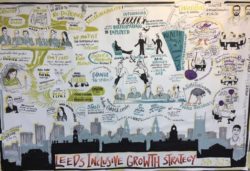The future of Leeds Inclusive Growth Strategy: Post-event Reflections
By. Sherif Youssef
How can the Leeds City council work with different partners within the region to deliver on the Leeds Inclusive Growth Strategy 2023? This question took centre stage at the Future of the Inclusive Growth Strategy event last October that I organised together with my colleagues George Edwards and Carlos Montano from the School of Sociology and Social Policy. The event attracted over sixty participants from different sectors (public, private and civil society) to address fundamental questions facing the future of the city.
 This event was focused on three key themes. The first theme aimed to address the challenges and the opportunities facing the Leeds Inclusive Growth Strategy based on by a panel discussion led by Dr. Mark Davis (The Bauman Institute, School of Sociology and Social Policy) and different panel speakers (Dr. Fiona Bolam, Head of Economic Policy, Sector Development and Innovation, Leeds City Council; Mike Hawking, Acting Policy and Research manager at Joseph Rowntree Foundation; Matthew Brown, Council Leader at Preston City Council; Will Richardson, Senior Partner, PWC Leeds and Stuart Clark; Private Investor and founder of Leeds Digital Festival).
This event was focused on three key themes. The first theme aimed to address the challenges and the opportunities facing the Leeds Inclusive Growth Strategy based on by a panel discussion led by Dr. Mark Davis (The Bauman Institute, School of Sociology and Social Policy) and different panel speakers (Dr. Fiona Bolam, Head of Economic Policy, Sector Development and Innovation, Leeds City Council; Mike Hawking, Acting Policy and Research manager at Joseph Rowntree Foundation; Matthew Brown, Council Leader at Preston City Council; Will Richardson, Senior Partner, PWC Leeds and Stuart Clark; Private Investor and founder of Leeds Digital Festival).
To help find the pearls of Leeds as a city, particularly after Brexit, the key questions addressed to the panellists involved the possibilities of shifting the political and economic narrative from building inclusive growth towards an inclusive economy, specifically in the event of an economic recession. Furthermore, discussions revolved around community wealth building, which was characterised as a grassroots economic development to address inequalities and poverty within a local city and how different anchor institutions could keep profits local. The Preston City Council currently implements this model.
Finally, how the private sector could take some responsibility in Leeds City to address the rising tide of in-work poverty and how the current local and central government industrial strategy policies could boost the most needed productivity were discussed.
 Grappling with the question of automation and its consequences for the future of work within the Leeds City Region, the second panel discussion led by Dr Vera Trappmann (Centre for Employment Relations, Innovation and Change, Leeds University Business School) mainly addressed this topic.
Grappling with the question of automation and its consequences for the future of work within the Leeds City Region, the second panel discussion led by Dr Vera Trappmann (Centre for Employment Relations, Innovation and Change, Leeds University Business School) mainly addressed this topic.
The panellists discussed the new socio-economic reality associated with automation, particularly in a city such as Wakefield (as discussed by Paul Hayes, Corporate Policy Manager of Wakefield City Council), the viability of implementing Universal Basic Income (UBI), as discussed by Malcolm Torry, UK Citizen’s Basic Income Trust, and challenges associated with grand ideas associated with Universal Basic Services (as discussed by David Bent, Institute for Global Prosperity, UCL), as well as how to address the challenges associated with automation effectively (as discussed by Will Stronge, Autonomy UK).
 In order to make these abstract ideas more concrete, the final part of the event was a workshop led by Dr Richard Tunstall (Centre of Enterprise and Entrepreneurship, University of Leeds Business School) and Graham Ponton (Sector Development, Innovation and Economic Policy, Leeds City Council) that aimed to crystallise the need to create an entrepreneurial economy based on an effective partnership between the public and the private sectors to foster economic resilience within Leeds City. The workshop consisted of round-table discussions addressing four themes. The first theme was solving social issues via entrepreneurship, the second was overcoming barriers to entrepreneurship, and the third was a criticism of entrepreneurship, which asked the following questions - is entrepreneurship a good thing? Does it work? The last topic was creating an entrepreneurial ecosystem in the Leeds City Region.
In order to make these abstract ideas more concrete, the final part of the event was a workshop led by Dr Richard Tunstall (Centre of Enterprise and Entrepreneurship, University of Leeds Business School) and Graham Ponton (Sector Development, Innovation and Economic Policy, Leeds City Council) that aimed to crystallise the need to create an entrepreneurial economy based on an effective partnership between the public and the private sectors to foster economic resilience within Leeds City. The workshop consisted of round-table discussions addressing four themes. The first theme was solving social issues via entrepreneurship, the second was overcoming barriers to entrepreneurship, and the third was a criticism of entrepreneurship, which asked the following questions - is entrepreneurship a good thing? Does it work? The last topic was creating an entrepreneurial ecosystem in the Leeds City Region.
Finally, the question before us as a result of this event is to how to address the momentous shift in the political and economic landscape within the Leeds City Region effectively after Brexit, and the ways in which entrepreneurship can create a more resilient economy and boost productivity in Leeds. The latter will be addressed in a workshop next May as part of the Leeds Digital Festival 2019.
